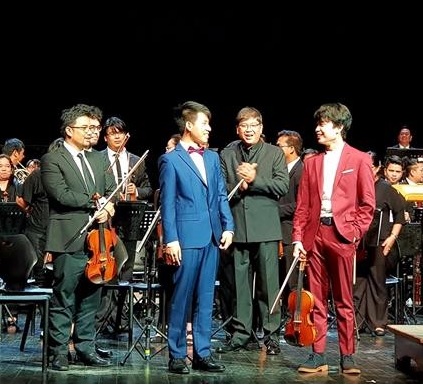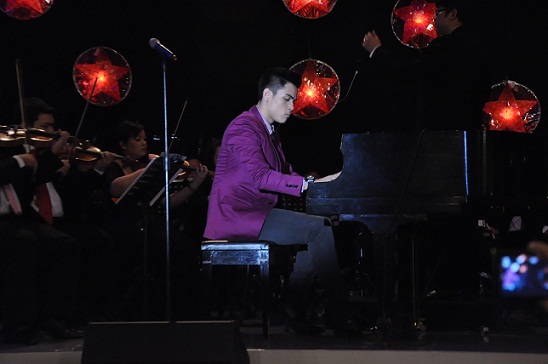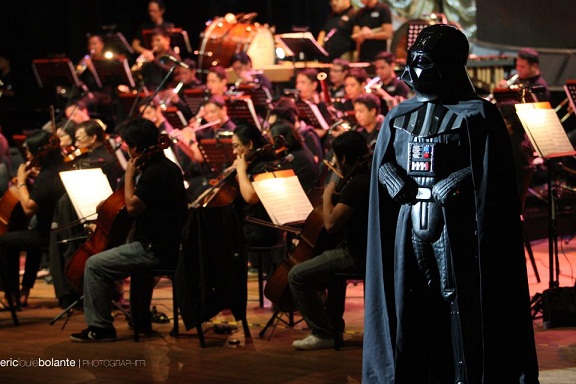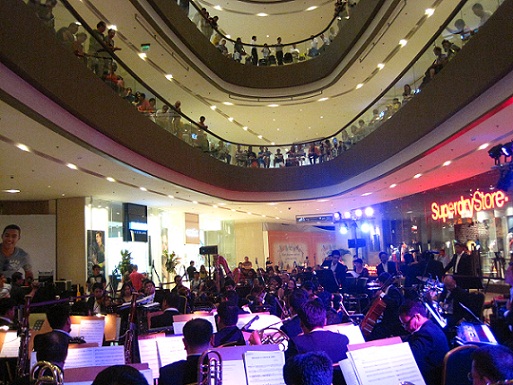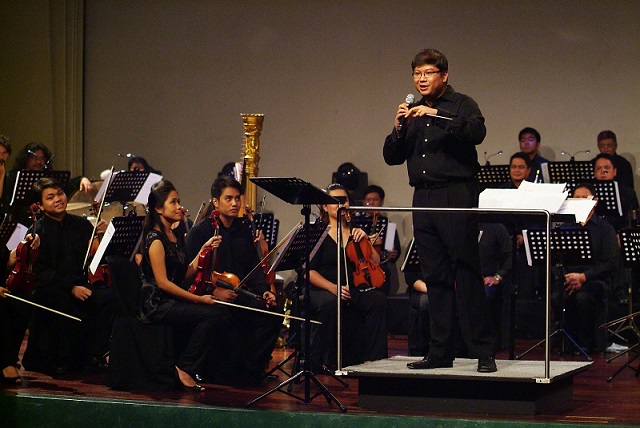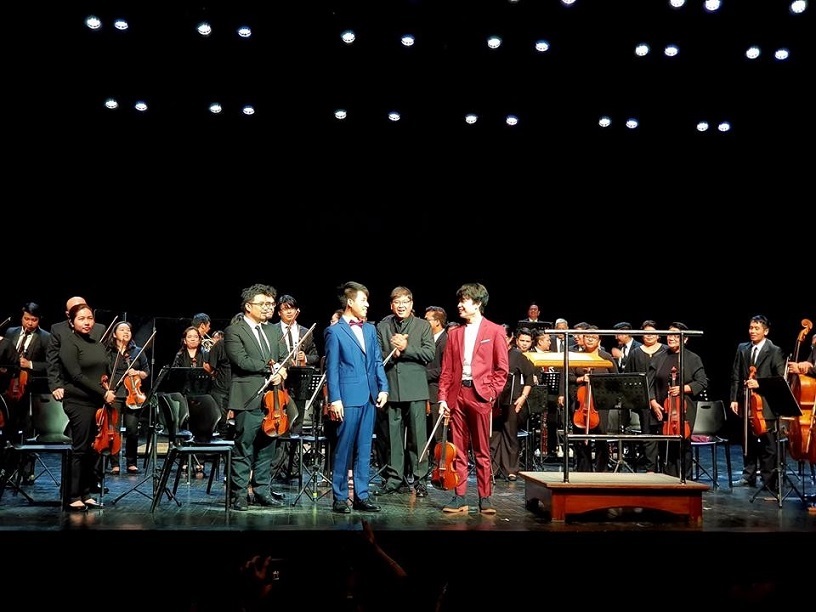
Pianist Jet Stephen Chong and violinist Adrian Nicolas Ong with conductor Gerard Salonga and the ABS CBN Philharmonic during curtain call. Photo by Anthony Say.
Just when you thought the ABS-CBN Philharmonic would be relegated to scoring soap operas and musicals and accompanying pop artists at the Araneta Coliseum, you watch their latest Saturday night (July 20) concert and emerged highly convinced it has not cut ties with classical music.
The concert also unveiled a new concert venue called the Hyundai Hall – Arete at the Ateneo de Manila University campus grounds. The acoustics is not bad, the hall quite intimate as you see musicians openly greeting acquaintances in the audience before a concert. But the most revealing discovery is that young people dominated the audience along with seasoned concertgoers some of them walking with a cane and accompanied by private nurses.
From one’s abode in Pasig City, the concert hall is just less than 30 minutes away passing through C-5 compared to the two or three hours of commuting going to the CCP.
The concert is also well-managed with attentive and courteous ushers showing you to your assigned seat.
The program consisted of two Tchaikovsky warhorses – the Piano Concerto No. 1 in B Flat Minor with Jet Stephen Chong as soloist and the Violin Concerto in D Major, Op. 35 with the Mannes-bound Adrian Nicolas Ong as soloist.
What was interesting was that music director Gerard Salonga did away with the tired old overtures to open a concert and came up with seldom heard Chopiniana Op. 46 with excellent orchestration by Alexander Glazunov. It was overwhelming to see hear piano notes transformed into orchestral sounds with amazing results.
Over the years, Salonga has proven himself a good learner as he immersed himself into wide classical repertoire and always emerging equal to the challenge.
This was highly felt in the Chopiniana opener where he underlined the highly lyrical parts and made something grand and eloquent of the new orchestration.
Under his baton, the orchestra responded with precision and towards the end, you realize the orchestra is back with a vengeance and giving classical music the treatment it deserves.
This was highly evident in the reading of the Tchaikovsky piano concerto which to many music lovers is virtually a national anthem because of its familiarity.
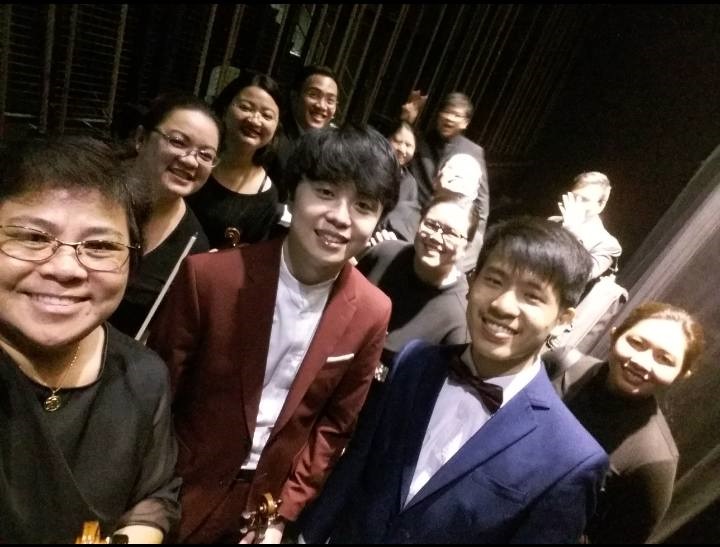
ABS-CBN soloists Jet Stephen Chong and Adrian Nicolas Ong with members of the orchestra. Photo by Chona Noble.
To be sure, the opening chords of Chong was less than dramatic used as one was to fiery openings. But wrapping up the concerto from its first, middle and finale parts, you see a millennial interpreter glued to the music and giving it his best shot. It was almost note perfect and the ABS-CBN Philharmonic gave him full support enough to elicit inner fire in his interpretation. Used to the versions of the veteran interpreters, the millennial touch to the concertos was quite different and one took it as the young people’s way of giving new approach to an old and tired warhorse.
The last part opened with an orchestral arrangement of Rachmaninoff’s Vocalise. Used as one was to its vocal version, it was a revelation that the piece could actually be transformed into an orchestral number with its vocal magical parts intact. It was a fitting opener before the Tchaikovsky violin concerto with Ong as soloist.
Ong is not one soloist you can identify with physical movements that others thought would define the concerto. He was in fact steady in one position but giving the music its due. There is palpable musical instinct and intelligence working side by side and you wonder why you are getting them from a young interpreter.
The sound he defined was crystal clear and it was even more dazzling in the cadenzas. Throughout the three movements, he was in control without losing his inspired moments.
As in the first concerto, the orchestra under Salonga gave the soloist so much room to prove himself and what a pleasurable night it was to see both soloist and orchestra in excellent rapport.
One thought that the concertos were tough enough and it was tall order to even ask the soloists to oblige with an encore.
Chong delivered a haunting Schumann piece and Ong gave an unaccompanied Paganini Caprice.
The euphoric reaction of the predominantly young audience was enough to convince one that classical music has a future in the millennial circle.
With the outside world in seeming disarray and chaos, Salonga quoted Leonard Bernstein in his souvenir program message: “This will be our reply to violence: to make music more intensely, more beautifully, more devotedly than ever before.”
Apart from his job as music director of the ABS-CBN Philharmonic, Salonga served for two seasons with the Hong Kong Philharmonic.In January this year, he started his term as resident conductor of the Malaysian Philharmonic Orchestra in Kuala Lumpur.He is all set to collaborate with pianist Cecile Licad and the South Denmark Philharmonic in a recording of Gershwin works under Danacord Label.
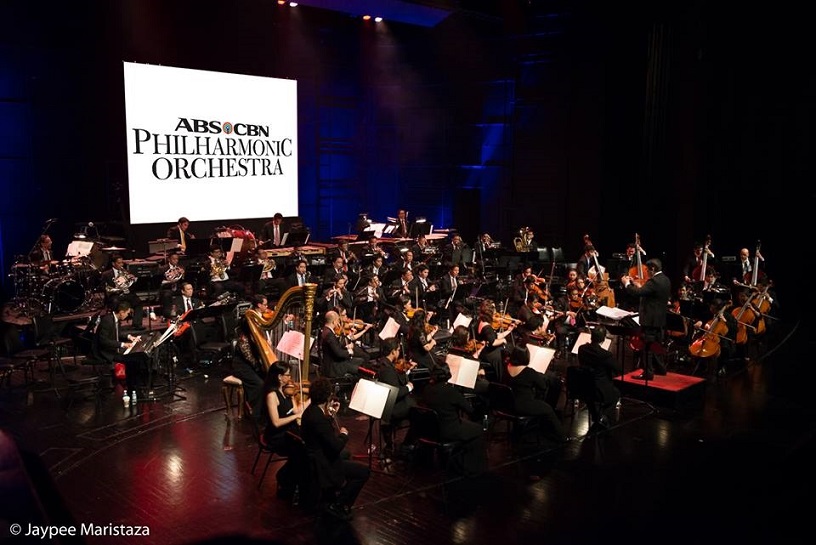 The ABS- CBN Philharmonic under Gerard Salonga. Back in top form.
The ABS- CBN Philharmonic under Gerard Salonga. Back in top form.
